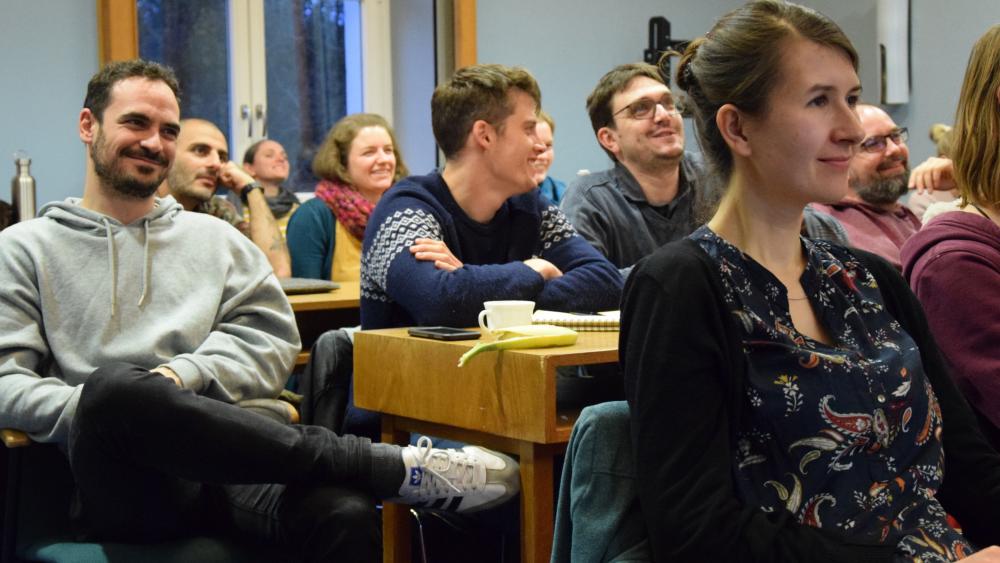
Photo: IGB
IGB is currently being assessed under the European Commission’s HRS4R for the third time. The first question is a simple one: Why?
Kirsten Pohlmann: The answer is also simple: We want to make sure that good employees enjoy working with us under the best possible conditions – and that those starting out on a career in research or related areas are well prepared for the task.
Why did IGB choose the more “difficult path” of an EU programme?
When I came to IGB as a postdoctoral researcher, there were not as many doctoral students and postdocs as there are today, so it was easier for the supervisors to ensure their individual professional development. Then, fortunately, there was a steady growth in the number of early-stage researchers who joined us, and the staff body became increasingly international, resulting in more diverse educational backgrounds. What started out as statistics courses evolved into the IGB doctoral programme. And this led, in turn, to our recognition of the need for systematic career support for all IGB employees.
In other words, the statistics course got promoted…
…and paved the way for other centrally organised professional development measures. What followed was training for junior group leaders, and then training for all group leaders – and finally the need for greater alignment and commitment. Given that IGB is a research institute with an international outlook, we opted for the EU’s HRS4R programme. An additional advantage is that we can learn a lot from other European institutions that started the process before us or have even better measures in place.
How has the HRS4R process changed things for staff at IGB?
We could, of course, have continued to work on our improvement of our own accord. But the official process means that HR development was further prioritised at IGB, enabling us to drive the necessary changes in a more systematic way. Development of the measures takes place in a highly participatory manner: the decision to improve our HR development strategy was taken by the IGB management. But the actual measures are developed by representatives from all staff groups, and are agreed on with the management. An excellent division of tasks, which guarantees that everyone backs the measures. This process requires us to honestly ask ourselves, time and again and in a structured way, where we see potential for improvement.
And where is there potential for improvement at IGB?
Initially, examples included the issues of internationalisation and the need to communicate in two languages at IGB; the “overlooked” postdoctoral researchers; and the lack of transparency in recruitment and tenure track procedures. We are now well prepared when it comes to English, and need to start focusing on German-language content again – in other words, it will still take some time for us to implement bilingualism to suit everyone. For postdocs, we now have a Postdoc Society, a training budget and annual networking meetings in place. What’s more, we have introduced clearly structured and binding recruitment guidelines and a tenure track procedure that other institutes use as templates.
It sounds like the HRS4R process has proved effective for IGB.
Yes, over the years we have realised the importance of having a plan that helps us to systematically tackle our weak spots, without losing sight of the big picture. As a result, we no longer lag behind in many areas, and are even one step ahead of developments in some cases. As part of our Second Action Plan, for example, we sought to develop a recruitment process that meets high international standards. So we got hold of the EU’s first OTM-R draft and implemented the “Open, Transparent and Merit-based Recruitment of Researchers”. This meant that we were years ahead of the national regulations, enabling us to recruit excellent scientists from all over the world. Another advantage that we came to appreciate later: it is much easier for institutes with the “HR Excellence in Research Award” to apply for Horizon 2020 funding.
Which measures have made it to the current action plan?
We now interpret “4R” – i.e. “for researchers” – much more broadly, and also focus on academic support staff, who are vital to research at IGB. Our goal is to pool our technical and methodological skills more effectively, and to support further training of our staff in this field. We also want to develop a diversity concept for IGB by 2023, and significantly step up our gender equality efforts once again. We have almost completed our policy against sexual harassment, which will be accompanied by training activities. Other key areas for the next three years are the topics of Open Science, our internal communication, and the renewal of our IT infrastructure, which should facilitate hybrid working, among other things. The plan also includes support for international research internships for our early-stage researchers – just to mention a few of the 70 or so measures.
Are you concerned about the results of the current evaluation?
Well, does anyone like being evaluated? Actually, I’m intrigued, more than anything else. The experts look to see whether we have successfully implemented our 2017-2020 Action Plan. And they assess whether our plans for 2021-2023 are overly ambitious or not ambitious enough, whether the measures seem promising, and whether we have dropped important aspects from the agenda. Of course, we would love them to conclude that everything has been thought through and implemented perfectly. But as we all know, there is always room for improvement. We are therefore eager to find out how and where they propose further improvements. The experts have considerable experience from their own research institutions as well as other facilities in Europe, so we can expect all sorts of good ideas.
The interview was conducted by Katharina Bunk.



